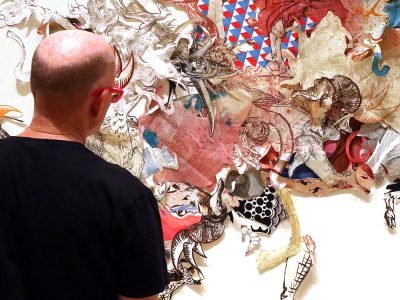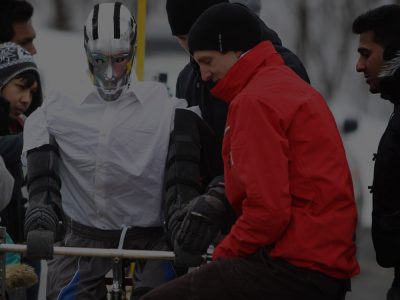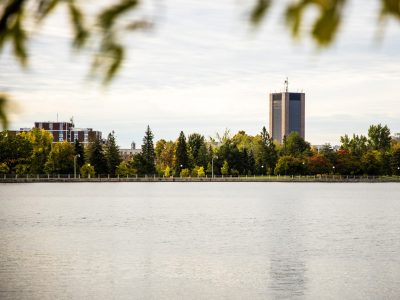By Dan Rubinstein
Photos by Chris Roussakis
Impactful partnerships and advances in sustainability were front and centre on Aug. 27, 2019 as a group of government, technology and higher education leaders came together at Carleton University for a preview of the new Smart Environments building.
The morning reception in the 70,000-square-foot, five-floor building, in a room overlooking the Rideau River, was an opportunity for the university to celebrate the importance of collaboration and thank partners who have contributed to both the $29.5-million building and a $20.7-million upgrade for Carleton’s nearby co-generation facility.
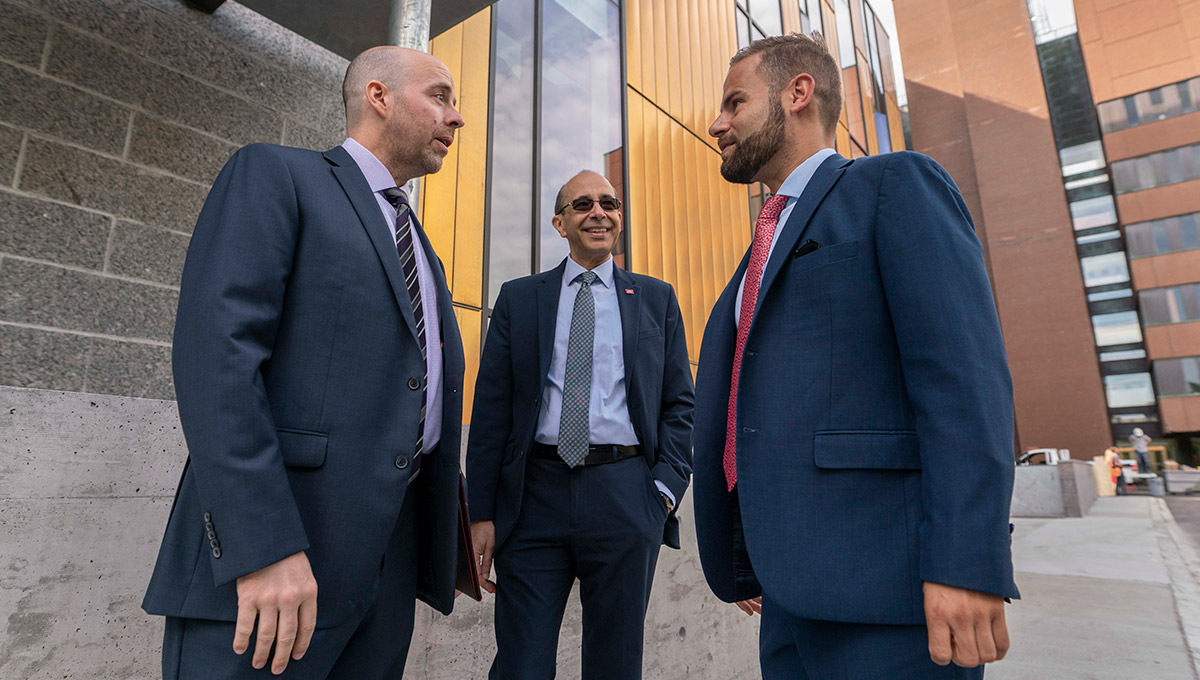
President Benoit-Antoine Bacon, Rafik Goubran, Vice-President (Research and International) and MPP David Piccini
“This is a very exciting day for the university,” said Carleton President Benoit-Antoine Bacon. “We are showcasing two projects that demonstrate the importance of partnerships, of how we can work together for good.
“This beautiful building that we’re in would not have been possible without the generous $13.45 million we received from the Government of Canada’s Strategic Investment Fund. I can’t overemphasize the importance of government support for research, science, innovation and sustainability.”
The building – Advanced Research and Innovation in Smart Environments (ARISE) – is a hub specifically designed for multidisciplinary research partnerships with government and the private sector, Bacon explained after welcoming distinguished guests who attended the event, including MPP and Parliamentary Assistant to the Minister of Training, Colleges and Universities, David Piccini, Capital Ward City Councillor Shawn Menard, Algonquin College President Claude Brulé, Universities Canada President Paul Davidson, Centre of Excellence in Next Generation Networks President, Jean-Charles Fahmy, and Guillaume Paradis, Hydro Ottawa’s chief electricity distribution officer.
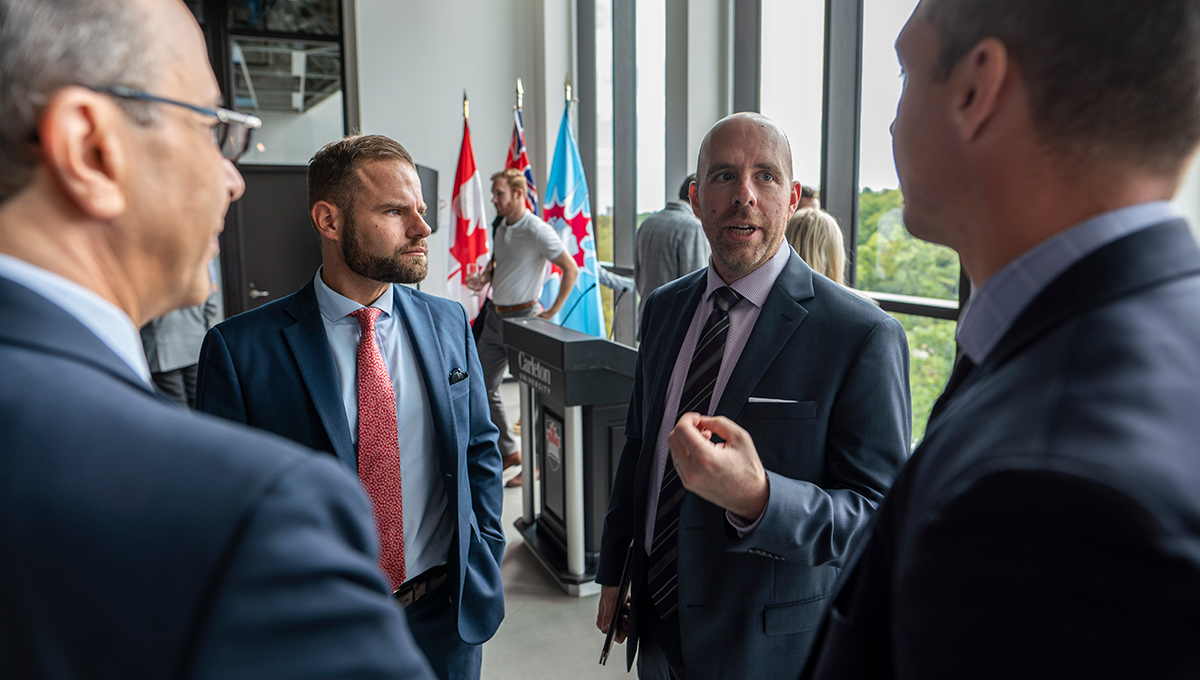
A Space That is Accomodating to Multidisciplinary Research Teams
All of the space on each floor will be fitted for the needs of multidisciplinary research teams in a custom-designed way, bringing together external partners with professors and students from all five Carleton faculties. Some of those potential partners — including Invest Ottawa, Mitacs, Mindbridge and Ciena — were represented at the preview reception.
“The collaborations that take place inside these walls will focus on research and training in clean tech, health tech, smart cities, information and communication technologies, the Internet of Things, accessibility, and water and energy conservation,” said Bacon.
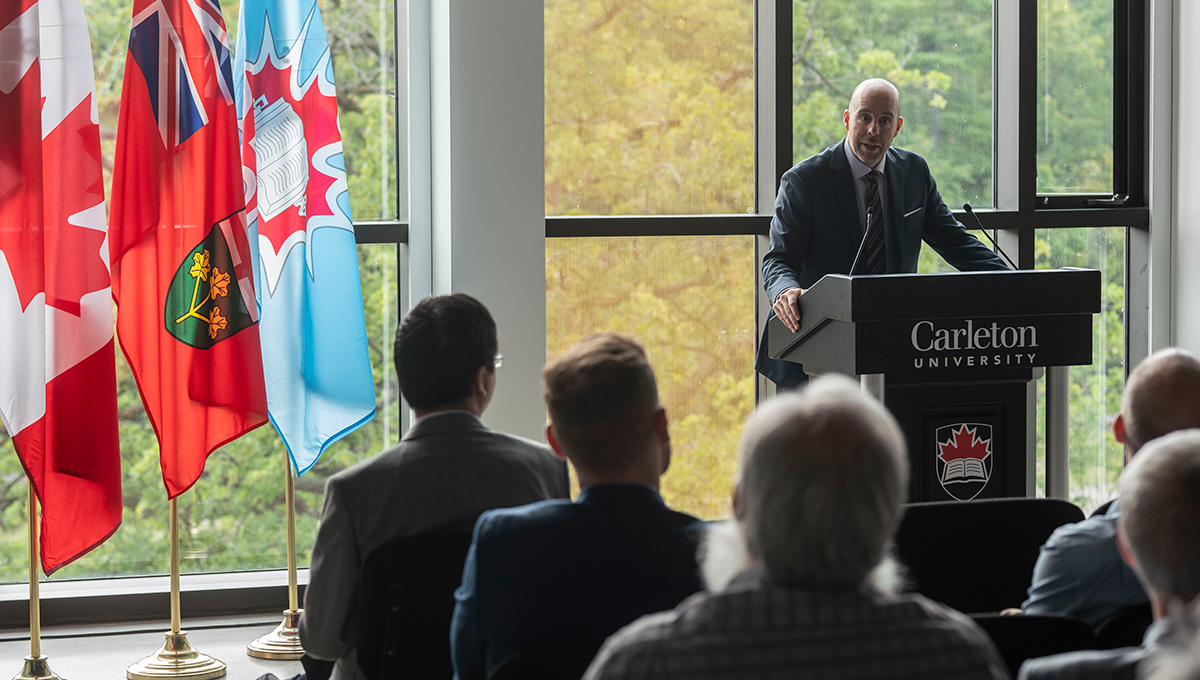
“The building will also be the headquarters of Carleton-led national networks such as the new Canadian Accessibly Network, of Efficiency Canada — a national voice for energy efficiency — and of the new Canadian Permafrost Research Network. With startup spaces to encourage the creation of businesses and creative spaces built to foster partnerships, we will leverage emerging technologies to create new networks that will improve the social, economic and environmental health of all Canadians.”
The Smart Environments building “is an important milestone for Carleton,” MP Catherine McKenna, Canada’s minister of Environment and Climate Change, said in a written statement.
“This provides professors, students and their peers a new and welcoming environment with better opportunities to get hands-on experience in the technology sector. Carleton is a leading institution in economical and sustainable practices, and I congratulate you on this new chapter.”
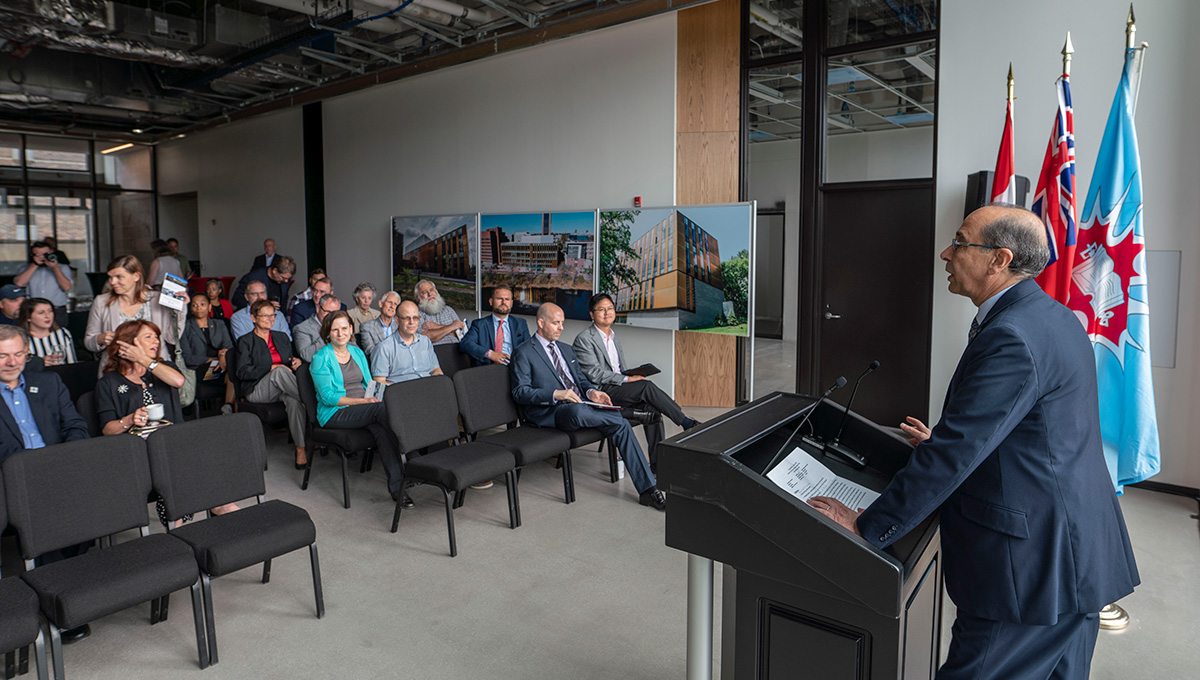
Glimpsing an Early Vision for Advances in Smart Environments
“As a research-intensive university, Carleton is proud of its many award-winning researchers,” said Rafik Goubran, the university’s Vice-President (Research and International), who emceed the event.
“We are very pleased to share a small glimpse into their early vision for advances in smart environments and accessibility research. Research teams will be moving in progressively over the course of the year.”
Goubran talked about the upgrades to the co-generation facility, which were possible thanks to $5 million in incentive funding from Hydro Ottawa to lower load demand on the local hydro grid and $213,000 from the Ontario Strategic Investment Fund.
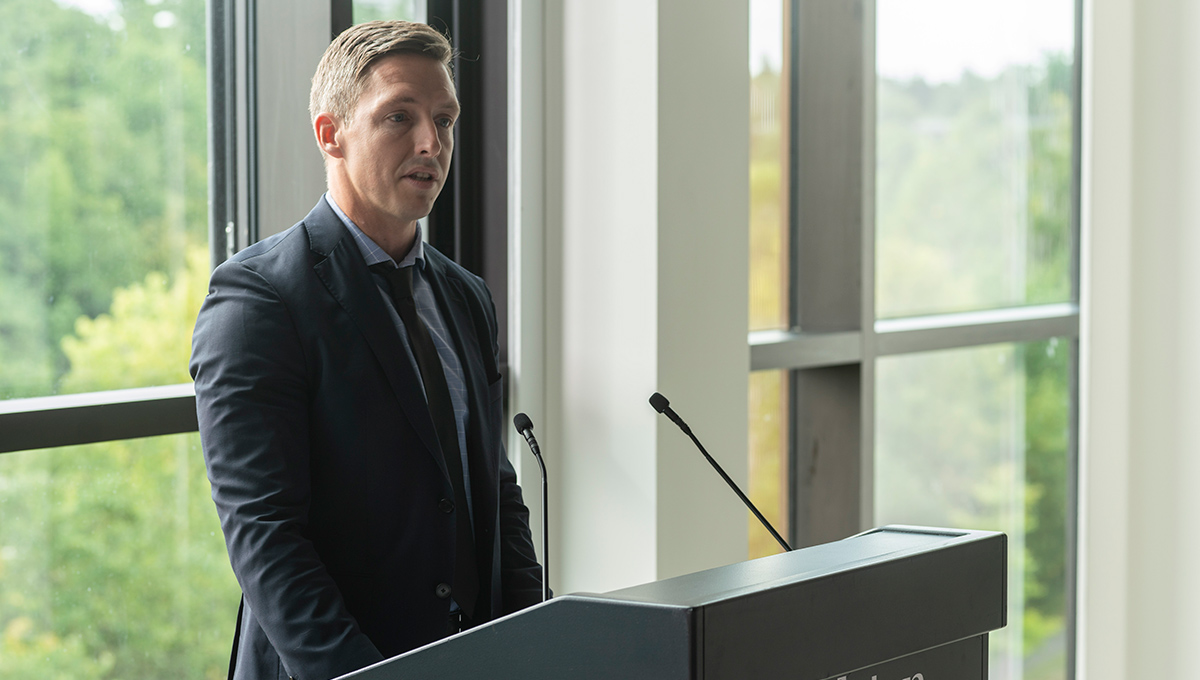
Guillaume Paradis, Chief Electricity Distribution Officer at Hydro Ottawa
The facility’s new 4.6 megawatt natural gas-fired turbine will provide up to 40 per cent of electrical consumption on campus, and the combined heat and power (co-generation) technology will use natural gas to also produce steam that will provide cooling in summer and heating in winter.
“I’m especially proud that new instrumentation will feed live data to an engineering lab, giving Carleton students research opportunities in energy conservation and feeding into the academic mission of the university,” said Bacon.
“We’re not only making our campus more sustainable, we’re integrating research, education and sustainability as one, and that’s amazing.”
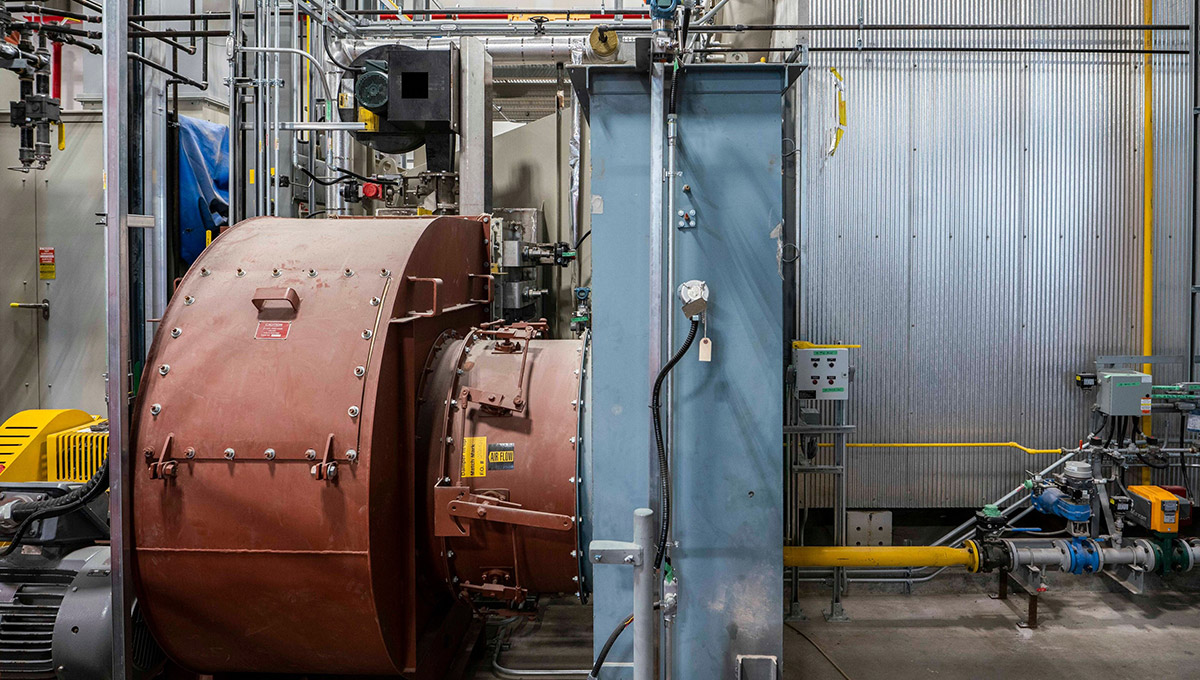
Collaboration, Exploration and Experimentation
Goubran introduced Hydro Ottawa’s Paradis, who noted the co-generation project received the largest single funding contribution from the utility’s conversation programs in Ottawa.
“The future for us will involve partnerships,” said Paradis, “and Carleton has been an exemplary partner for us. Carleton is a true leader in responsible energy stewardship and an early adopter of innovative energy technology.
“We must evolve the energy industry with our partners to develop new technology to support a resilient electricity grid, with a focus on sustainability and resilience to severe weather conditions.
“This shows what’s possible when we all work together toward a common goal,” he added.
“Innovation is not a theoretical thing when parties come together and collaborate. We can make things happen today. Our sustainable future is coming to life at Carleton.”
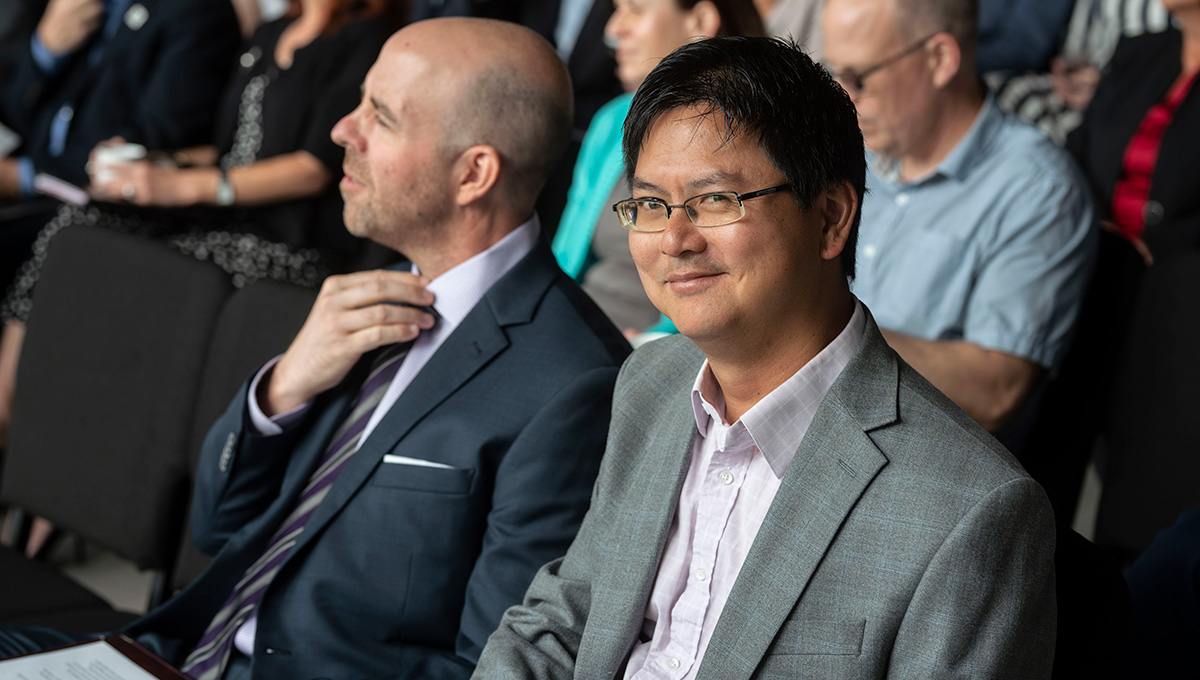
President Benoit-Antoine Bacon and Prof. Adrian Chan
Goubran also introduced Systems and Computer Engineering Prof. Adrian Chan, director of Carleton’s Research and Education in Accessibility, Design, and Innovation (READi) training program and one of the architects of the university’s new Canadian Accessibility Network, which will move into the Smart Environments Building.
“This building will provide physical space for collaboration, exploration and experimentation,” said Chan, noting Carleton’s long history as a leader in accessibility research and student support, from the groundbreaking efforts of the Paul Menton Centre for Students with Disabilities to the path to meaningful jobs provided by the David C. Onley Initiative for Employment and Enterprise Development, as well as research conducted by faculty and students in fields ranging from engineering and policy to history and music.
“I’m excited,” said Chan, “and am looking forward to being part of this hub for impactful research and innovation.”
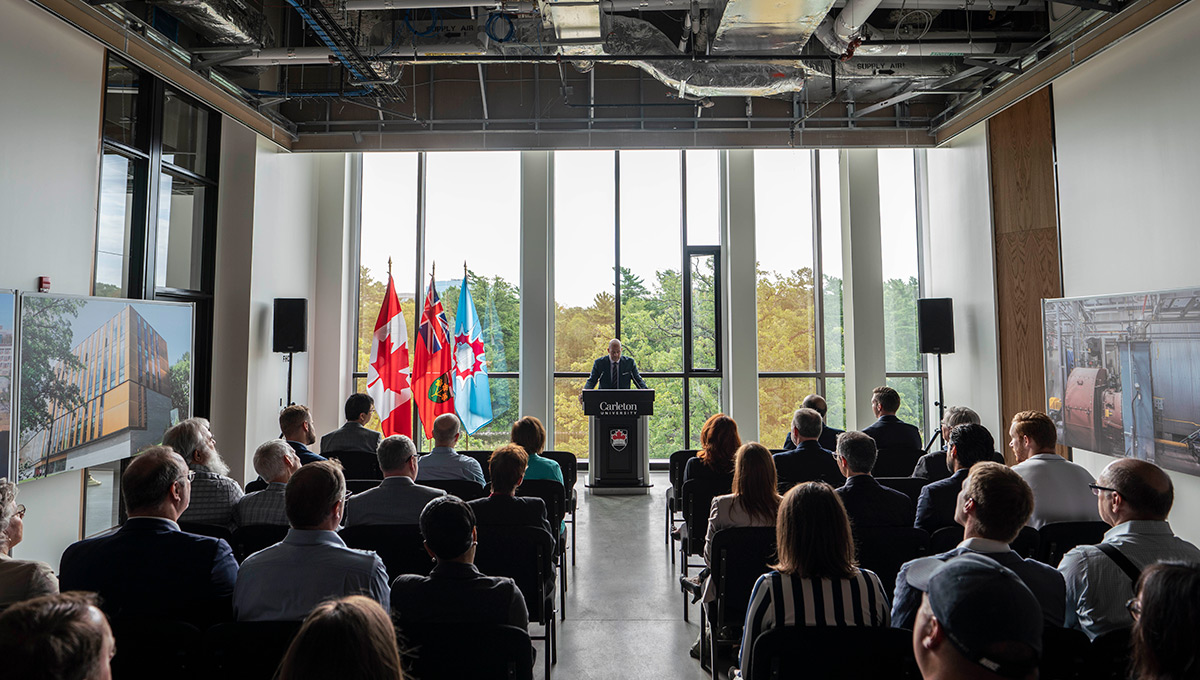
Tuesday, August 27, 2019 in Environment and Sustainability, Faculty of Engineering and Design, Research
Share: Twitter, Facebook
